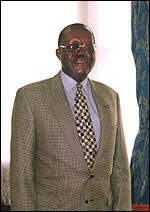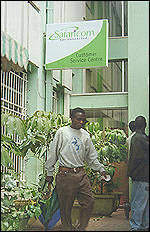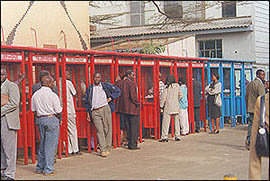
|
 |
 Kenya Posts & Telecommunications Corporation Kenya Posts & Telecommunications Corporation
(KPTC) |
Interview with:
Hon. Ndolo Ayah,
Chairman,
Nairobi, June 22th 1999
Contact:
Visiting Address: General Post Office, 7th Floor (Postal Towers). Nairobi
Postal Address: P.O.Box 30301, Nairobi, Kenya
Tel: (254) 2 227401 or (254) 2 247833
Fax: (254) 2 251071
|
KPTC is splitting July 1st 1999 opening to new investors, second operators of mobile phones, etc. How is the division of KP&TC going to take place? Are you ready for it?
We are very much prepared for it. We have been prepared for it for the last 2 years in fact. What we had been waiting for was for the law to be passed, the Kenya Communications Act which divides the former Kenya Post & Telecommunications into 3 entities:
The Communications Commission of Kenya (CCK) which will be the regulatory body,
Postal Corporation of Kenya, the postal services, which will be a wholly owned Government corporation,
Telkom, which will deal with the telecommunications business and, although it is going to be wholly owned by the government initially, in turn it will be privatized. Telkom will then become a company registered under the Company's Act, which means it will be a commercial entity.
We have had a program over the last two years developing towards this end by June 30th 1999. In the process we had consultations with a lot of people such as the World Bank, consultants such as Peat Marwick, and Barclays Bank, etc. who have helped us to make sure what structure we needed, not only in a legally sound manner, but also in an economically sound manner. We have now come to the end of that arrangement, so that by the 30th of June 1999 the Minister will have to gazette the fact that KP&TC is dissolved. By July 1st 1999 the three entities mentioned earlier will come into existence.
What is going to be the ownership structure of these 3 companies you have mentioned?

Initially the shareholding is going to be by the government but, right after we come into existence as a commercial organization from July 1st 1999, we will be embarking in a program of looking for strategic investors, i.e. we are looking for companies in the sector who are interested in investing in the telecommunications sector within Kenya. We have already been quietly looking for them for the past 6 months, but it is going to be a public issue, so we are going to advertise and say: "we want people to express an interest in investing in telkom". What the Government has decided in matters of policy is to offer 26% of Telkom shares to strategic partners. They will all come in and sharehold in this company while also helping in the management.
We have also decided that after doing that over a period, we will offer a substantial shareholding package to the public of Kenya through the Nairobi Stock Exchange. We are talking about 20% of the total shareholding. We are actually looking forward to the situation, within a year or two, when the government will have divested about 46-50% of its interests in Telkom to private investors. We have not really quite decided if we want to sell the package to the public to only Kenyans or to any investor who can buy shares in Nairobi. Obviously we are reasoning that since Kenyans have put in a lot of money into this structure through the years, when privatizing we should give them the first option rather that the second option, so that they can own these assets.
Thus we are looking at a situation where progressively Telkom is going to be not only commercial, but also privately owned. The government will be moving away fast by Kenyan standards, but gradually by international standards.
KP&TC is going to be split into 3 entities; you are the chairman of KP&TC now. Where will you be after the splitting?
That leaves me as chairman of KP&TC until the 30th of June. Actually a board has already been appointed which will be the board of Telkom from July 1st, 1999. We have a process called vesting, so when we start fresh from the 1st of July, there will be assets vested in CCK, Kenya Postal Services and Telkom. Quite selfishly I have to say we are going to be vested in Telkom.
What are you looking for in the strategic investors you are inviting: the highest bidder or the best technologically advanced?
Quite obviously the question of technology arises. I was personally involved in the privatization of Kenya Airways since I was Minister of Transport and Communications then. At the moment we have a very low level of penetration in the whole country, we need telecommunications to spread. KP&TC / Telkom by July 1st will not have as much money as it ought to have in order to be able to extend its services to all the people in Kenya. What we are looking for here now is for capacity to be increased. Thus we are looking for an investor who is going to increase our capacity to provide services efficiently. I mean people with the technology who will be able to contribute to our ability to provide services. We are looking for a company that has money obviously, but of course the technology, which as you know is an area which is expanding every minute. Thus to summarize we are looking for companies who have the capacity in terms of finance, of management, and obviously, in terms of technology. Here for instance we have our own people who are very well advanced in the technology of telecommunications, so we are looking for the right investor to enhance the capacity of our own people. | The development of Kenya in many ways heavily relies on the development of telecommunications. For this reason you are allowing for many companies to come into the Kenyan market, but how are you preparing yourselves in order to become more competitive?
Quite obviously the very fact that we are splitting means that we are accepting competition. We are going to compete with a lot of other people and we need to be prepared. Lots of things have to change our own ability to be able to learn and accept the new technology, but primarily the hindrance that we have (and which a lot of people have been complaining about) is that we have not been investing in this sector for a long time. We have used very old structures and quite frankly, we need to have the money to catch up. One of the reasons why we are getting a strategic investor is to enhance our ability to compete. That is why we have said that there will be a time lag between the time we invite the strategic investor to come in and the time when we can actually invest in this sector. The structure of telecommunications will be in the hands of Telkom for a while. Other people can connect into it through CCK who is going to be the licensor.

We are also going to limit companies to regional licensing (that is not Telkom, that is government policy) for a while, so that investors that come in, as well as Telkom, will have a period to adjust. What we do not want is somebody to come in and say: "we want to invest in Kenya but we only want to invest in Nairobi, Kisumu, Mombasa", that is, in established areas, because the overall policy of the government is that everybody gets the maximum coverage. So we are actually prepared for competition, even though we might not be very well set. But we are not in the position to do anything about it. We just have to go out and compete, and that is one of the reasons why we are going to invite people to invest in Telkom.
You are developing internet, getting into mobile phones. what other areas would you like to develop within telecommunications?
We are getting into a world market, a global village. It is not in our hands to decide. You cannot really pick and choose now, although primarily we want to concentrate on Telkom. Mobile telephones are becoming the most prominent development in the rest of the world. We have now to catch up with that. In Uganda, for instance, they have gone way out. We are going to have to do the three of them almost at the same time. Internet is now a tool which will have to expand. At the moment we already have a lot of service providers in that area. The main network is owned by the government through Telkom, so for the time being it is a structure the people will have to wire themselves to, but it is going to be opened to anybody who wants to gain access to Internet. Thus Internet, mobile phones and regular phones are going to be developed almost at the same time. We have already formed a company which is part of Telkom called Safaricom. However we, by the nature of our business, are going to be involved in telephones for quite a while, but we will have to go into all the other areas as well if we want to remain in business. It is no longer in our hands, since we are going to be licensees like anybody else from the 1st of July 1999. But that also means we have to prove we have the ability to be able to provide those services. Others will come and say "we have more ability, we are richer, we are more technologically advanced, and so on", and we will have to compete with them in the same field.
What is going to happen with your employees once the splitting takes place?
We have had too many employees. We are running old structures which are very costly, so part of the restructuring has been to retrench, reducing the number of our workers, and Telkom would like to shed off quite a number of them. With more efficient equipment we need less people. So reduction of overheads and costs is going to be a primary element of the restructuring. We want to reduce about 20% of our work force, which is a lot of people.
Are you planning on expanding to the countries of the Region?
One of the things we have set forth to do is to establish a telecommunications network in East Africa as part of the Community. Kenya for a long time has been the hub of the region. Despite the setbacks we have received in the past few years, we are still the strongest. You might claim that Uganda and Tanzania have developed faster, but when you are smaller it is easier to do so. We are still very strong, and I think we are certainly going to be the main communication hub in East Africa and play an important role in the development of the region. The network being established in East Africa will actually be mostly controlled by us since we have the largest network.
Can you give us a final word for our readers?
Kenya is very well set for expansion in telecommunications. We are committed to communicate with the rest of the world. Since communications is an essential part of business now we want to make Nairobi and Kenya the center for communications for Eastern and Central Africa. New competitors coming into the market are charged with the responsibility of not only providing services to Kenya, but to provide services for the rest of the world, as a liaison between the world and Kenya. I would like to invite all businesspeople who want to invest in Kenya to take a look at what we are doing to make sure that we are going to be very competitive. We are a very rich and large market. |
|
© World INvestment NEws, 1999.
This is the electronic edition of the special country report on Kenya published in Forbes Global Magazine.
November 29th 1999 Issue.
Developed by AgenciaE.Tv |
|
| | | | |
| |
|

